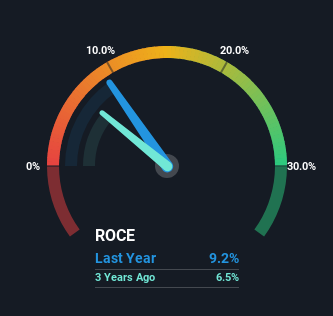- United Kingdom
- /
- Food
- /
- LSE:ABF
Associated British Foods (LON:ABF) Will Be Hoping To Turn Its Returns On Capital Around

What trends should we look for it we want to identify stocks that can multiply in value over the long term? Firstly, we'll want to see a proven return on capital employed (ROCE) that is increasing, and secondly, an expanding base of capital employed. This shows us that it's a compounding machine, able to continually reinvest its earnings back into the business and generate higher returns. Although, when we looked at Associated British Foods (LON:ABF), it didn't seem to tick all of these boxes.
Return On Capital Employed (ROCE): What Is It?
For those that aren't sure what ROCE is, it measures the amount of pre-tax profits a company can generate from the capital employed in its business. The formula for this calculation on Associated British Foods is:
Return on Capital Employed = Earnings Before Interest and Tax (EBIT) ÷ (Total Assets - Current Liabilities)
0.092 = UK£1.4b ÷ (UK£19b - UK£3.7b) (Based on the trailing twelve months to September 2023).
Thus, Associated British Foods has an ROCE of 9.2%. In absolute terms, that's a low return but it's around the Food industry average of 11%.
View our latest analysis for Associated British Foods

Above you can see how the current ROCE for Associated British Foods compares to its prior returns on capital, but there's only so much you can tell from the past. If you'd like to see what analysts are forecasting going forward, you should check out our free analyst report for Associated British Foods .
The Trend Of ROCE
When we looked at the ROCE trend at Associated British Foods, we didn't gain much confidence. Around five years ago the returns on capital were 12%, but since then they've fallen to 9.2%. Although, given both revenue and the amount of assets employed in the business have increased, it could suggest the company is investing in growth, and the extra capital has led to a short-term reduction in ROCE. If these investments prove successful, this can bode very well for long term stock performance.
The Bottom Line On Associated British Foods' ROCE
In summary, despite lower returns in the short term, we're encouraged to see that Associated British Foods is reinvesting for growth and has higher sales as a result. In light of this, the stock has only gained 5.5% over the last five years. Therefore we'd recommend looking further into this stock to confirm if it has the makings of a good investment.
While Associated British Foods doesn't shine too bright in this respect, it's still worth seeing if the company is trading at attractive prices. You can find that out with our FREE intrinsic value estimation for ABF on our platform.
While Associated British Foods may not currently earn the highest returns, we've compiled a list of companies that currently earn more than 25% return on equity. Check out this free list here.
New: Manage All Your Stock Portfolios in One Place
We've created the ultimate portfolio companion for stock investors, and it's free.
• Connect an unlimited number of Portfolios and see your total in one currency
• Be alerted to new Warning Signs or Risks via email or mobile
• Track the Fair Value of your stocks
Have feedback on this article? Concerned about the content? Get in touch with us directly. Alternatively, email editorial-team (at) simplywallst.com.
This article by Simply Wall St is general in nature. We provide commentary based on historical data and analyst forecasts only using an unbiased methodology and our articles are not intended to be financial advice. It does not constitute a recommendation to buy or sell any stock, and does not take account of your objectives, or your financial situation. We aim to bring you long-term focused analysis driven by fundamental data. Note that our analysis may not factor in the latest price-sensitive company announcements or qualitative material. Simply Wall St has no position in any stocks mentioned.
About LSE:ABF
Associated British Foods
Operates as a diversified food, ingredients, and retail company worldwide.
Flawless balance sheet with solid track record and pays a dividend.
Similar Companies
Market Insights
Community Narratives



